Garage Door Locks: A Comprehensive Guide to Secure Your Home
For many of us, the garage is a workshop, a storage area for valuable tools, a space for our cherished bicycles and cars, or even an alternative entrance to our homes. Yet, according to crime statistics, garages are among the top targets for burglars. Why? Because they’re perceived as easy access points. Often, garages are less secure than the front door, and since they’re somewhat isolated from the main living areas, a thief can break in without immediately alerting the homeowners. The significance of garage door locks is more than the physical barrier. A sturdy lock serves as a potent deterrent for would-be intruders. When they see a formidable lock, it often makes them reconsider their intentions, realizing the challenge and potential risks of attempting a break-in. The role of a robust lock isn’t just to ward off potential threats, it stands as the frontline defense for your home and safety.
Different Types of Garage Door Locks
When it comes to garage door locks, variety is essential for ensuring optimum protection. From traditional mechanisms to modern innovations, there are a number of locking systems designed to cater to different needs and security levels. It’s this diversity that allows homeowners to find a lock that not only secures their garage but also aligns with their daily routines, design preferences, and peace of mind.
Mechanical Locks
Slide Bolt Locks
The slide bolt lock remains one of the most effective ways to secure a garage door. Operating on a simple mechanism, the slide bolt lock involves a bolt that slides into a receiver to secure the door. One of its standout features is its reliability. There are no fancy components that could malfunction, and its manual operation means it won’t let you down during power outages. While particularly suited for manual garage doors, it’s important to make sure it’s properly installed and aligned to offer maximum security. Coupled with a padlock, it can be a formidable barrier against unauthorized access.
Check on Amazon: HILLMASTER Slide Bolt Gate Latch
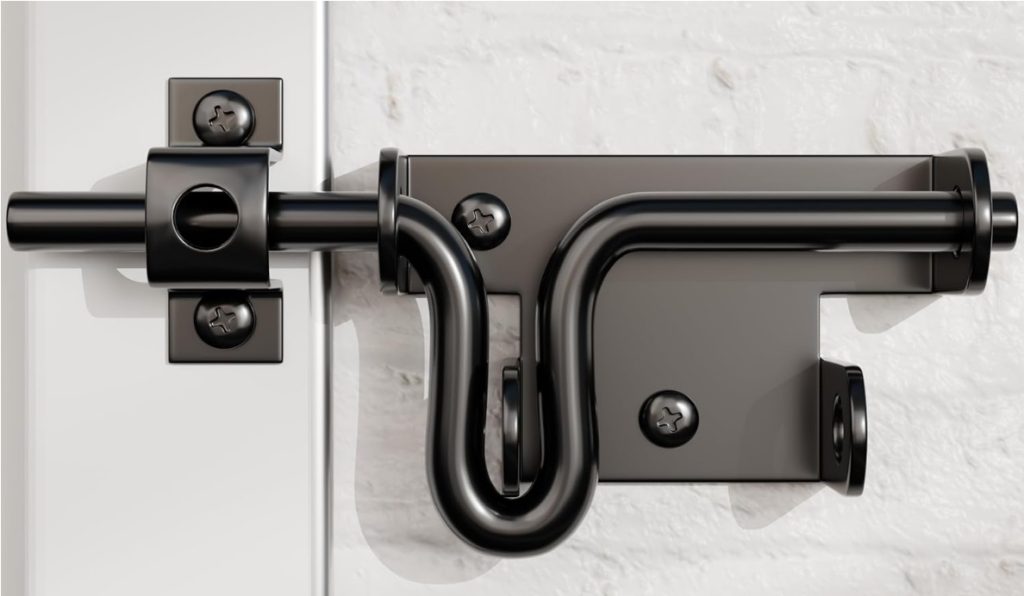
T-Handle Locks
Named aptly for its T-shaped design, this lock requires a specific key type, unlike the slide bolt. The unique design makes it more resistant to tampering, as conventional lock picking methods often prove ineffective against it. The T-handle lock is versatile, finding its place on both manual and automatic garage doors. The handle’s ergonomic design ensures ease of use, while its sturdy build can withstand regular wear and tear.
Check on Amazon: Bauer T-Handle Lock
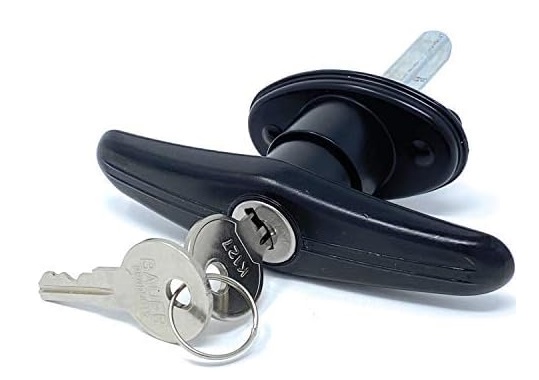
Deadbolt Locks
Deadbolt locks are used frequently on the primary entrances of homes. Unlike spring bolt locks, which can be easily forced open, a deadbolt requires the key to be rotated to open, providing an extra layer of security. Deadbolts for garage doors operate similarly to those used for main house entrances. They feature a strong, cylindrical bolt that, when locked, extends into a secure receptacle within the door frame. The strength of the deadbolt comes from the fact that it isn’t spring-activated; a burglar can’t simply jimmy it open with a credit card or slide a knife in to trip it. Deadbolt locks can be found in both single and double cylinder configurations, providing options based on the desired level of security and convenience.
Check on Amazon: Kwikset 660 Deadbolt Deadbolt Lock
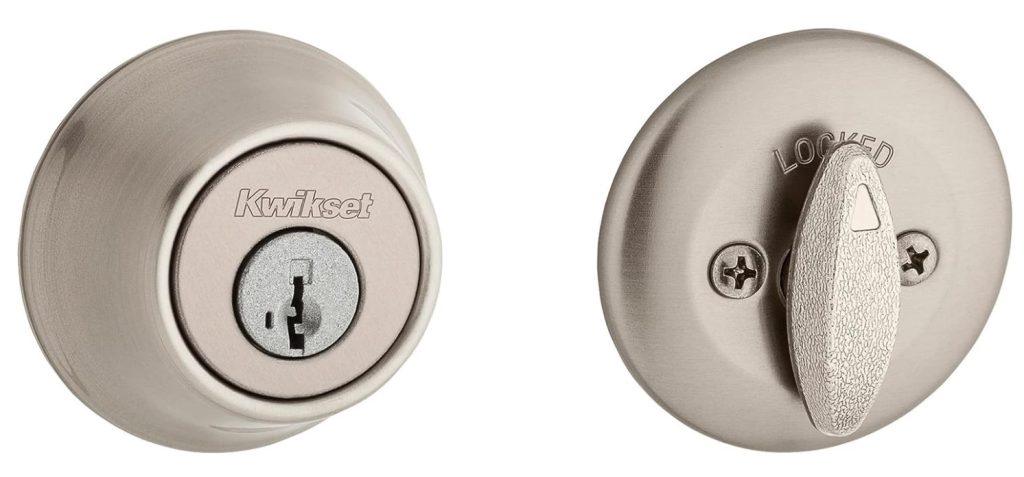
Electronic Garage Door Locks
The fusion of technology with traditional security systems has paved the way for electronic garage door locks. These modern locks offer enhanced security, convenience, and an array of features that couldn’t have been imagined a few decades ago.
Keypad Locks
Keypad locks eliminate the need for physical keys. Instead, they rely on a numeric code or password entered into a keypad. It enhances the security given the absence of a traditional keyhole, techniques like lock picking become irrelevant.
Keypad locks for garages typically feature a panel placed outside the garage and users can set a unique code. The code either unlocks the door or triggers the garage door opener. Many of these systems come with additional features such as one-time use codes for guests or service workers, or the ability to change the code regularly to further bolster security. The primary concern with keypad locks is ensuring the code remains confidential and is changed periodically to prevent unauthorized access.
Check on Amazon: Kwikset Halo Keypad Wi-Fi Keyless Smart Door Lock
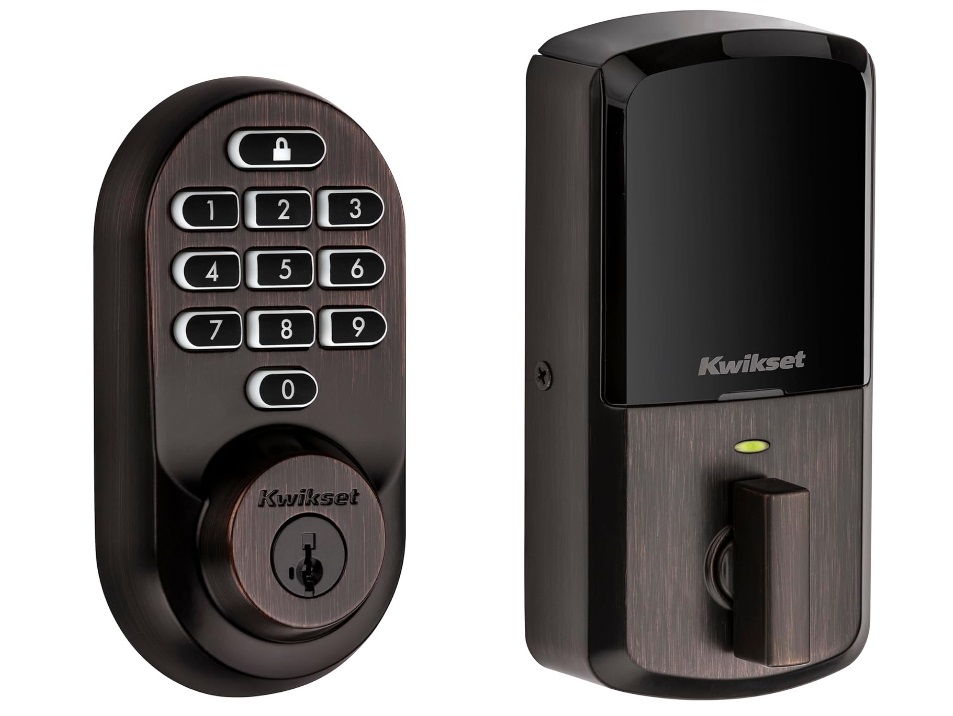
Key Fob Locks
Typically used as remote controls for garage doors, these small devices allow users to access their garages with a simple press of a button, eliminating the need to manually insert keys or input codes. Key fob locks have seamlessly blended the tactile convenience of traditional keys with the advanced security features of modern electronics. Their encrypted signals and unique frequencies, combined with rolling code technology, ensure a heightened level of security, making it challenging for potential intruders to replicate or intercept signals.
However, while key fobs offer a dynamic balance between security and convenience, they’re not without vulnerabilities. If lost or stolen, they can pose a security risk, though prompt deactivation can mitigate potential threats. As with all security measures, regular updates and cautious storage practices ensure that key fob systems maintain their efficacy in keeping garages secure.
Check on Amazon: Solidremote 371LM 373LM 971LM 973LM, for LiftMaster Chamberlain
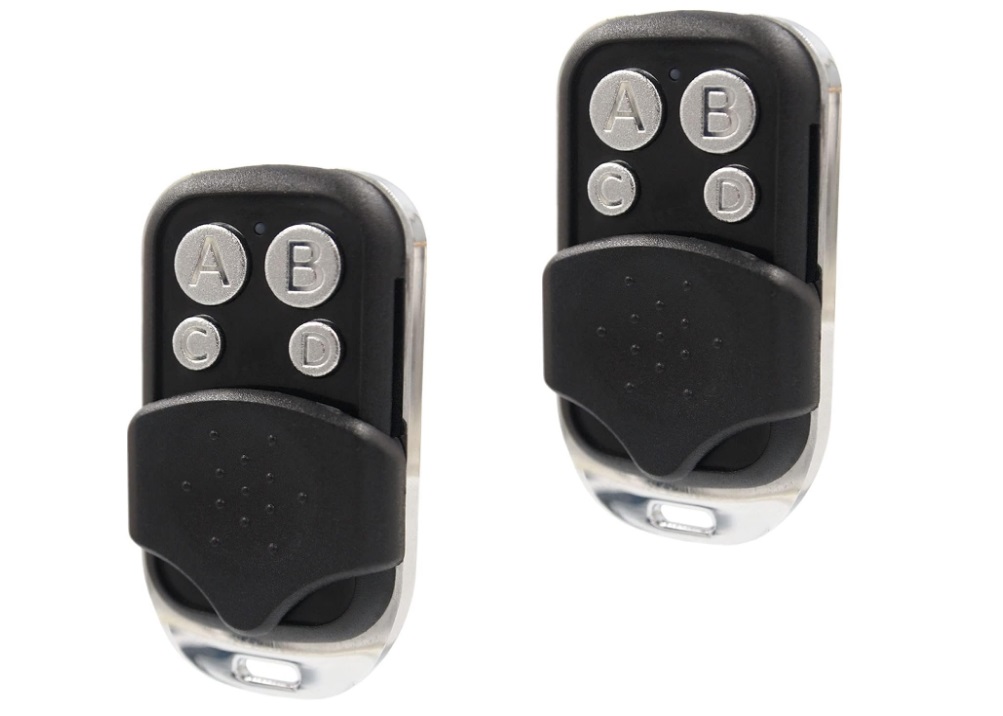
Smart Locks
The pinnacle of electronic garage door security, smart locks are controlled through smartphones, tablets, or other smart devices, often via dedicated apps. What sets smart locks apart is their versatility and array of features. They can be remotely locked or unlocked, which means if you forget to lock your garage when you leave, a simple tap on your smartphone can secure it. Many smart locks also offer activity logs, notifying you whenever the door is locked or unlocked, and by whom. Integrations with home security systems or cameras provide an added layer of protection, allowing homeowners to monitor their garages in real-time.
Another significant advantage of smart locks is the ability to grant access without providing a physical key. If a friend or family member needs to access your garage while you’re away, you can temporarily grant them access through their phone. Once they’re done, access can be revoked, ensuring continuous security.
However, like all electronic systems, smart locks are not without their vulnerabilities. They rely on Wi-Fi or Bluetooth connections, which can be susceptible to hacking if not adequately secured. Ensuring strong, encrypted connections and regularly updating software can mitigate these risks.
Check Amazon: Smart Door Lock, hornbill 8-in-1 Keyless Entry Door Lock Biometric Fingerprint Smart
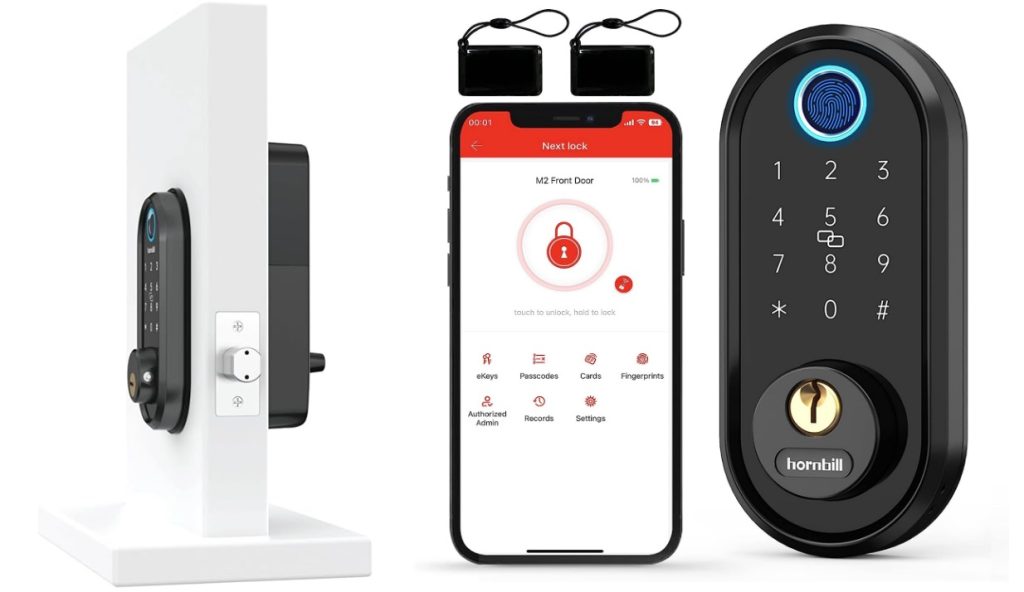
How to Choose the Best Garage Door Lock
Choosing the optimal garage door lock is a decision that not only affects the safety of your possessions but also the overall security of your home. Given the array of choices available in today’s market, making the right selection can be difficult. But by focusing on a few key factors, you can navigate the options with clarity and confidence.
Assessing Your Needs
Every homeowner’s garage serves a unique purpose. For some, it’s merely a storage space for old memorabilia and tools. For others, it houses prized vehicles, valuable equipment, or even a workshop. Start by evaluating what’s behind those garage doors. If you’re safeguarding valuable items, it’s worth investing in higher-end locking mechanisms with advanced security features. Additionally, consider the frequency of use. If you access your garage multiple times a day, you might prioritize convenience, opting for electronic locks or key fobs.
The Reliability of the Lock
Look closely into the track record of the lock you’re considering. Look for brands with a reputable history and read user reviews. It’s essential to choose a lock that consistently performs well and withstands the test of time. Pay attention to durability, especially if you live in areas with extreme weather conditions. A lock might look sturdy, but how it fares against heavy rain, snow, or extreme temperatures determines its true mettle.
Ease of Installation
While the security features of a lock are important, the installation process shouldn’t be overlooked. For many, a lock that offers a balance between security and straightforward installation is ideal. Some advanced electronic systems might require professional installation, so factor in potential costs and the time it might take. Remember, a lock, no matter how advanced, only offers protection if installed correctly.
Common Issues and Their Solutions
Stuck Locks
One of the most common issues faced by homeowners is a lock that refuses to budge. Stuck locks can be a result of several factors:
Dirt and Grime Build-up: Over time, dirt and other contaminants can accumulate within the lock mechanism, making it difficult to turn.
Misalignment: Regular use, or external factors like someone trying to force the lock, can lead to the lock and its corresponding keyhole or bolt becoming misaligned.
Rust Formation: Particularly in areas with high humidity or salt in the air, rust can form, causing the lock to seize up.
Solutions:
Regular Maintenance: Periodic cleaning of the lock with a damp cloth, followed by drying, can prevent dirt accumulation. For the internal mechanism, using a specific lock lubricant can keep it functioning smoothly.
Adjustment: The lock or the bolt may need to be either readjusted or reinstalled.
Rust Prevention: Using rust-preventive sprays or solutions can help. If rust has already formed, a professional might be needed to replace or repair the lock.
Electronic Malfunctions
Electronic malfunctions are a common issue for modern garage locks. These can range from unresponsive keypads to smart locks not syncing with their apps.
Solutions:
Battery Check: For key fobs or electronic locks that operate on batteries, a simple solution might be replacing drained batteries.
Software Updates: Ensure your smart lock or electronic system is running the latest software version. Manufacturers often release updates to fix known bugs.
Resetting: In some cases, resetting the electronic lock or disconnecting and reconnecting it can resolve the glitch.
Professional Assistance: For more intricate issues, especially those related to wiring or internal electronics, consulting with the manufacturer or hiring a professional might be the best course of action.
Conclusion
Garage door security is an indispensable aspect of home protection. With a range of lock types available, from traditional mechanisms like slide bolts and deadbolts to advanced electronic systems such as keypads and smart locks, choosing the right one hinges on individual needs and preferences. Regular maintenance, combined with an understanding of potential issues and their solutions, ensures lasting effectiveness. An informed decision, grounded in personal needs and the lock’s reliability, is the key to safeguarding your garage.
FAQs
1. What are the benefits of electronic garage door locks?
Electronic locks offer a blend of enhanced security and convenience, often allowing remote access, integration with other security systems, and easy code changes.
2. How often should I maintain or check my garage door lock?
It’s advisable to inspect your lock every few months for signs of wear, rust, or electronic glitches. Regular cleaning and lubrication can also prolong its lifespan.
3. Are traditional locks like slide bolts and deadbolts still effective?
Yes, these locks have stood the test of time and, when installed correctly, provide a robust barrier against unauthorized access.
4. Can I install a new garage door lock myself?
While some locks, especially traditional ones, are suitable for DIY installation, more complex electronic systems might benefit from professional installation to ensure optimal functionality.
5. How do I decide between a keypad lock and a smart lock?
Consider factors like your budget, the desired level of security, convenience preferences, and integration with other home systems. If remote access and app integration are crucial, a smart lock might be a better fit. For simple code-based access without the frills, a keypad lock could suffice.





Comments are closed.